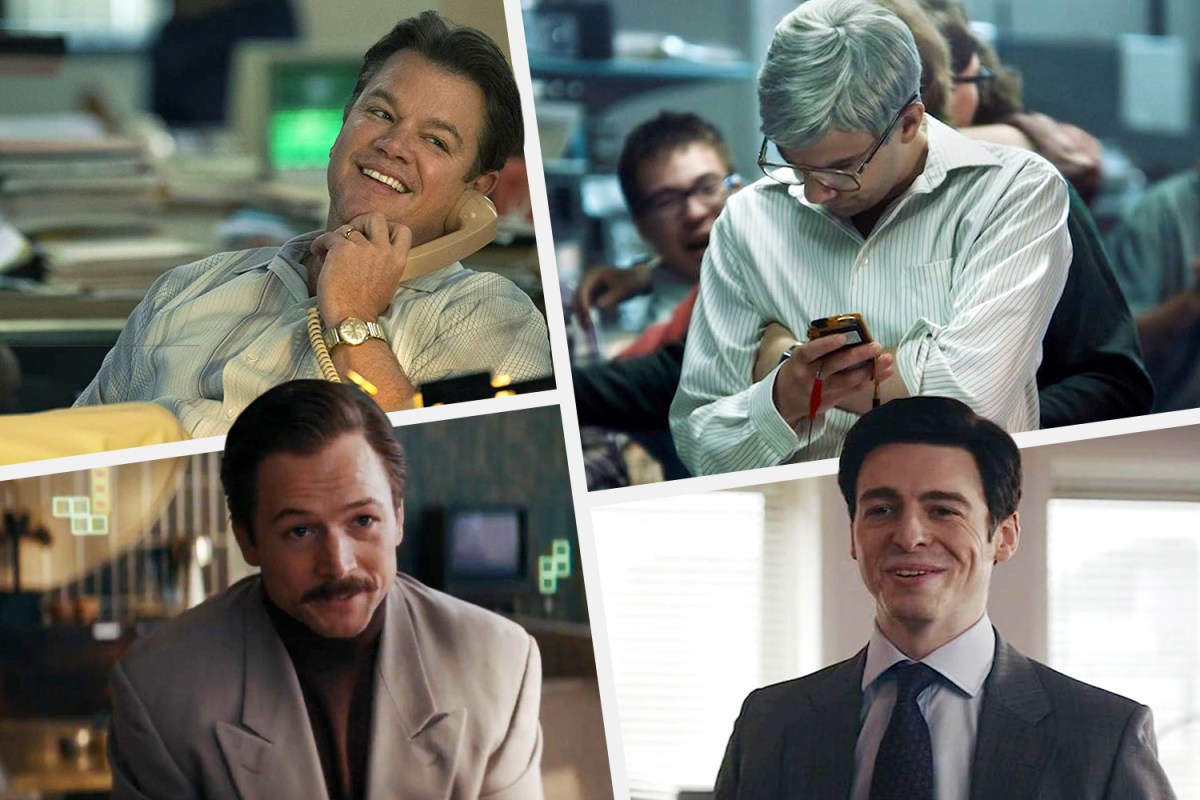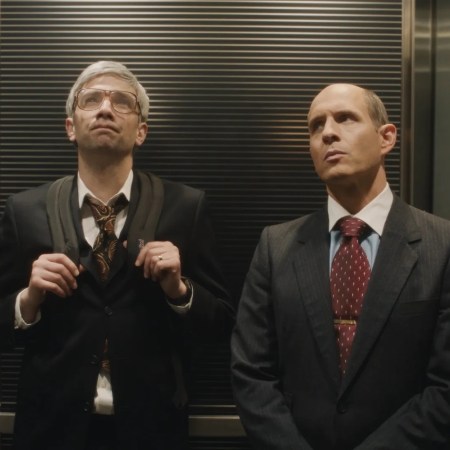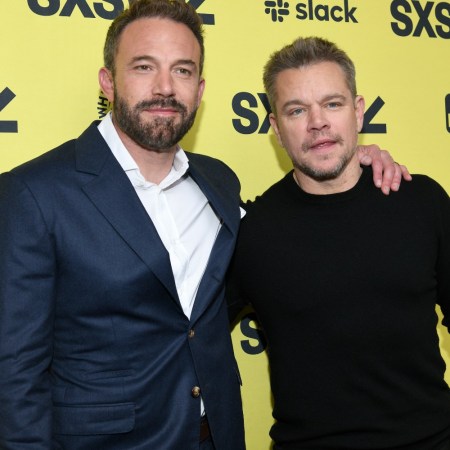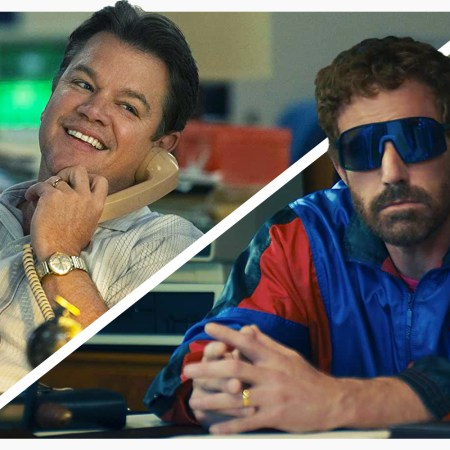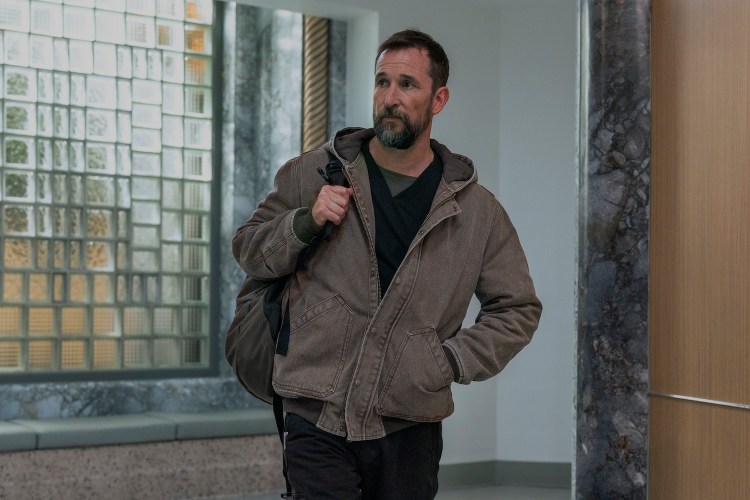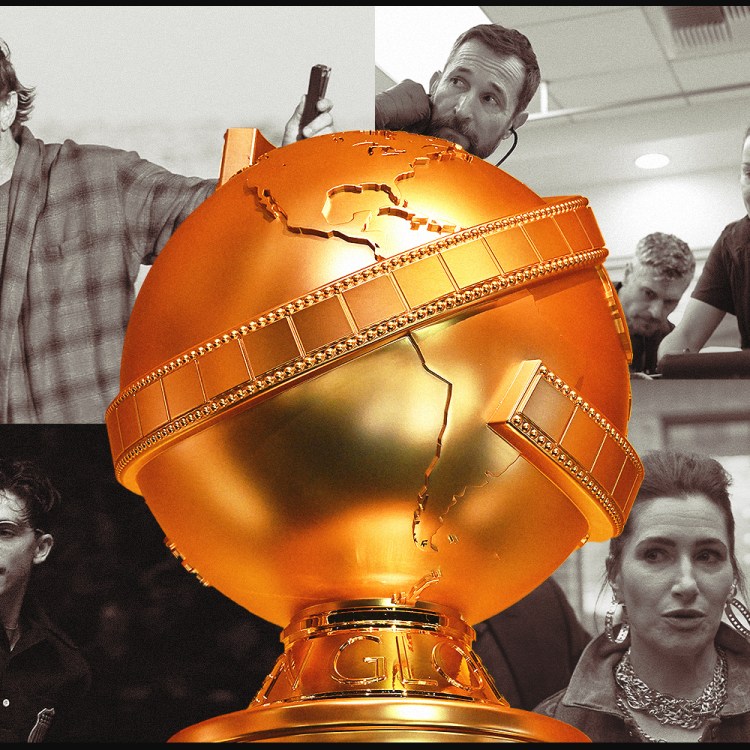“Poetry only makes the world bearable. It’s engineering that got us to the moon.” It’s shoe designer Peter Moore (Matthew Maher) who’s granted the big awe-inspiring, wall poster-friendly quote in Nike hagiography — sorry, Nike biopic — Air. Ironically, having succinctly argued the difference in value between those who say and those who do, the creative genius who so brilliantly captured the essence of Michael Jordan in a sneaker is then entirely overlooked for the motormouthed suits who helped sell it. And this has become something of a pattern in the most surprising new Hollywood trend.
Whereas 2022 was the year of the scammer, with the likes of Inventing Anna and The Dropout dramatizing, and you could argue glorifying, various get-rich-quick schemes ripped from the headlines, 2023 appears to be redressing the balance by lauding those who made millions the less immoral way. However, as best exemplified by Air, this crop is still very much obsessed with the wheeling and dealing.
Ben Affleck’s slightly bizarre fetishization of sports licensing has been criticized for completely sidelining the legend it lionizes. Jordan is notably absent, save for the unintentionally amusing boardroom meeting in which the camera has to skirt around the back of stand-in Damian Delano Young’s head. To be fair, though, the NBA icon’s tale has already been told on screen in an exhaustive 10-part documentary series (and a less cherished 1999 TV movie where he was depicted, rather unfortunately, by future convicted murderer Michael Jace). And like High Flying Bird, Air is the basketball drama where the basketball itself is almost irrelevant.
It’s Moore, who sadly died just weeks before filming began, that truly gets the shorter shrift, his significant contributions to the game-changing Air Jordan restricted to a couple of laboratory mock-up scenes and silent office cameos. Air is too busy repositioning Matt Damon’s Sonny Vaccaro and the rest of his 50-something male colleagues working for a multi-billion-dollar corporation as heroic underdogs to give credit where it’s really due. Of course, it’s not this year’s only brand origin story to celebrate the middleman, even if it’s undeniably the most cynical.
The inherently more charming Tetris focuses not on the addictive block puzzle’s Russian inventor Alexey Pajitnov, but Henk Rogers, the video game entrepreneur who through sheer doggedness turned it into a household name. Admittedly, the Apple TV+ original has greater reason to put all the contract wrangling centerstage. While Air’s are largely conducted amid the dreary wood paneled offices of Nike’s Beaverton headquarters, Tetris’ take place in London, Seattle, Tokyo and most significantly, Cold War-era Moscow where KGB honeytraps, corrupt ministers and underground clubs which blast ‘80s hair metal await.
Played by Taron Egerton, mustachioed Dutchman Rogers also makes for a more compelling figure than Damon and company’s back-slapping marketing men, his complete disregard for Communist protocol and the machinations of Robert Maxwell’s nefarious empire constantly toeing that fine line between bravery and recklessness. And as shown when Rogers hits upon the brainwave to increase the high score potential, he at least has some form of creative input into the consumer product, too.
Tetris at least affords Pajitnov (Nikita Yefremov) some notable screentime: in fact, he even gets to save the day during the climactic car chase, unarguably director Jon S. Baird’s most blatant concession to the Hollywood way. But having lived under the constant threat of the Iron Curtain, and with far more to lose than his new international friend, his story had enough drama to take top billing.
Blackberry, which charts how the titular company briefly triumphed in the smartphone wars, does give tech whiz Mike Lazaridis (Jay Baruchel), and to a lesser extent, his goofier partner in crime Douglas Fregin (director Matt Johnson) their props. That said, the nerdy pair must still wrestle for narrative control with Glenn Howerton’s Jim Balsillie, the volatile CEO whose unscrupulous business tactics quickened both their rise and their fall.
Then there’s the curious tale of Flamin’ Hot. On the surface, Eva Longoria’s directorial debut appears to wholeheartedly celebrate the maker rather than the middleman. Richard Montañez (Jesse Garcia) gets the full-blown biopic treatment, the Hulu/Disney+ original charting his rise from high school “burrito hustler” to factory floor janitor to DIY creator of the nation’s favorite mouth-burning cheese puffs. The only problem is, according to a 2021 Los Angeles Times expose anyway, Montañez had nothing to do with Flamin’ Hot Cheetos’ inception.
In fact, the film’s hero reportedly has more in common with the Rogers and Vaccaros of this world. Montañez was undeniably instrumental in the snack’s success. Though Frito-Lay argue it was his valuable insights into the Hispanic consumer market rather than a mastery of chili peppers where the Mexican-American’s assets lay: the official line is that a food professional team led by a junior employee named Lynne Greenfield originated and developed the line at the firm’s Plano headquarters.
Flamin’ Hot briefly acknowledges this version of events, cutting to a Midwest laboratory where spicy flavors are being concocted in test tubes. Yet it still insists Montañez’s natural home kitchen approach was the product’s real birthplace. Perhaps to cover its back, the movie concludes with the line, “We all write our own stories… You think I was going to let someone else steal mine?” Whatever the truth, it’s another 2023 release steeped in capitalist nostalgia.
This sudden influx perhaps shouldn’t be too surprising. With the wheels of the superhero train finally showing signs of slowing down, and the list of potential reboot candidates getting smaller each year, Tinseltown needs a new ready-made supply of instantly identifiable IP. And it’s understandable those directors who grew up immersed in the consumerism of the Reagan era (both Affleck and Baird were born in 1972, the latter no doubt soaking up all things American pop culture from his Scottish hometown) may have an emotional attachment to certain products.
Less clear, however, is why the spotlight is now shining on their less cinematic aspects. Loyalty to a brand doesn’t usually equate with a passion for its complex business acquisitions. Yet these films treat such bone-dry, and to the world at large fairly inconsequential, dealings with a sense of wonder similar to when Vaccaro first gazes at the Air Jordan.
Could the opportunity to explore super-sized subject matter in such an intimate way be a driving factor? Air, in particular, often plays out like a prestige stage production, after all. Its screenwriter Alex Convery told the Los Angeles Times such pictures are easier to execute than any more conventional biopic, adding, “It’s not about the thing, it’s about the people. There’s something interesting about those people that got the story to a point where everyone knows the product or the brand or whatever.”
Why Are There So Many Scammer Shows All of a Sudden?
What do we find so compelling about watching people get deceived?Tetris producer Matthew Vaughn, meanwhile, also feels there’s a timely public service element, with pandemic-hit society becoming misty-eyed about the times when crucial business deals were played out in person rather than over Zoom. However, it’s Blackberry’s Johnson who perhaps best summarizes why the paperwork rather than the invention is taking precedence: “There’s nothing narratively worthwhile in how a cellphone works.”
Interestingly, both Air and Tetris were distributed by streaming giants, an area of the entertainment industry which, thanks to dumb rebrandings, abrupt cancelations and wholesale erasures, is damaging its reputation quicker than you can say, “What the hell is Max?” While the timing is purely coincidental, these films still flatter the type of execs making such mind-boggling decisions, presenting them as plucky good guys simply trying to achieve the American Dream. “See, the corporate world isn’t always the soul-sucking vortex Succession depicts after all,” seems to be the byproduct message.
Maybe the forthcoming business biopics will change tact. Apple TV+’s The Beanie Bubble seems unlikely to relegate Ty Warner, the billionaire plush toy manufacturer who later pleaded guilty to tax evasion, to bit-player. And there’ll no doubt be plenty of corporate double-crossing in Jerry Seinfeld’s comeback, the tale of the 1963 breakfast pastry race inspired by an old stand-up routine. Yes, while most similar films sound like a joke stretched to feature-length, Unfrosted: The Pop-Tart Story actually is.
Who knows which consumer products will next get the big screen treatment nobody really asked for? Triple Power Push Pops maybe? Or perhaps Charmin Ultra Soft toilet paper? Whichever, the takeaway from this year’s watchable but inessential spate of corporate backstories is forget the small print.
This article appeared in an InsideHook newsletter. Sign up for free to get more on travel, wellness, style, drinking, and culture.
